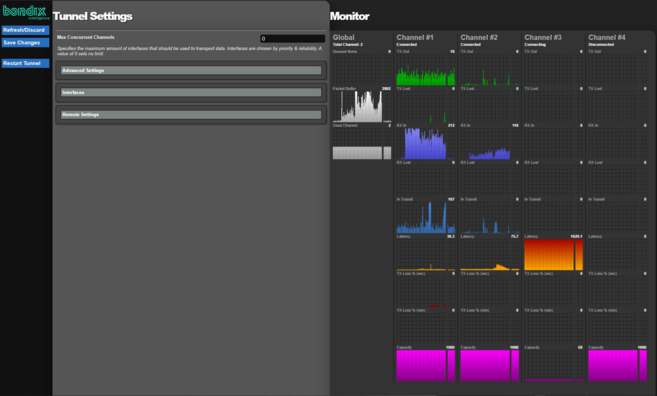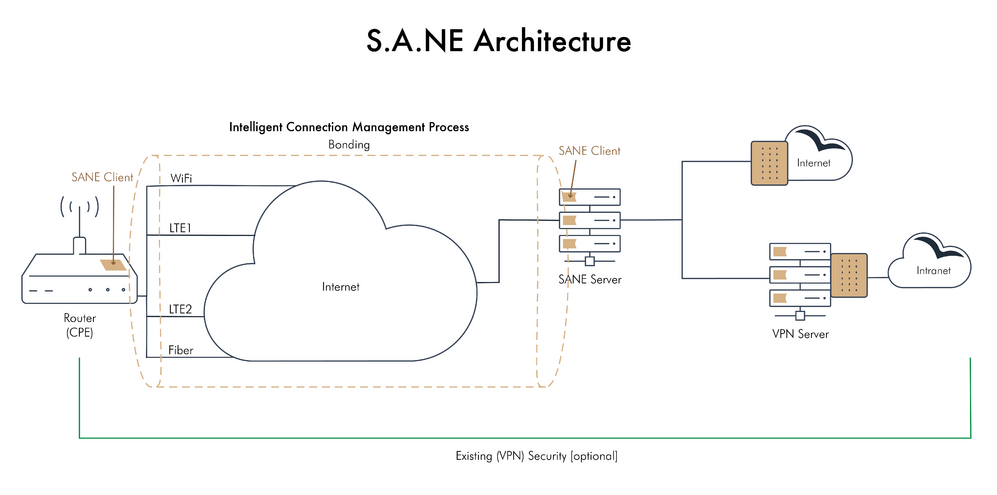Bondix by SIMA: Difference between revisions
m (Minor changes, fixed some mistakes) |
m (S.Kregzde moved page Bondix Intelligence to Bondix by SIMA) |
||
| (27 intermediate revisions by 4 users not shown) | |||
| Line 1: | Line 1: | ||
[[File:Bondix. | __TOC__<br> | ||
[[File:Bondix-sima1.png|alt=Bondix by SIMA|320px]] | |||
<br> | <br> | ||
==Introduction== | ==Introduction== | ||
The need for reliable connectivity with high bandwidths is continuously growing. | The need for reliable connectivity with high bandwidths is continuously growing. Bondix Intelligence (hereinafter: Bondix) developed its Simple Aggregation of Networks (hereinafter: S.A.NE) software to ensure reliable connectivity for all applications such as voice, video and data transmission. This applies to mobile as well as stationary deployments. | ||
This simple and efficient software solution can be installed on different platforms to enable these WAN aggregation functions. The | This simple and efficient software solution can be installed on different platforms to enable these WAN aggregation functions. The S.A.NE software implements bonding (aggregation) of, load balancing between, and seamless handover across, different WAN interfaces and WAN providers. It thus provides a highly available overall connection that keeps you online without interruption. | ||
==Application== | ==Application== | ||
To increase the throughput or availability of access to remote applications, the use of two or more connections is often chosen. These can be fixed network or wireless (WiFi, cellular) connections, or a combination of these. The question is how to manage the use of these different connections efficiently and easily. This is where the | To increase the throughput or availability of access to remote applications, the use of two or more connections is often chosen. These can be fixed network or wireless (Fiber, DSL, WiFi, cellular, satellite) connections, or a combination of these. The question is how to manage the use of these different connections efficiently and easily. This is where the S.A.NE software comes in. With the unique S.A.NE technology you ensure a highly available connection and optimal throughput. | ||
===High availability and bonding=== | ===High availability and bonding=== | ||
With a second connection via an alternative cellular network operator (or another WAN medium such as WiFi or satellite), the total bandwidth available for even a single TCP/IP connection can be increased, as well as the uptime. Line failures or network problems at service providers can thus be mitigated. With | With a second connection via an alternative cellular network operator (or another WAN medium such as WiFi or satellite), the total bandwidth available for even a single TCP/IP connection can be increased, as well as the uptime. Line failures or network problems at service providers can thus be mitigated. With S.A.NE, WAN scheduling is based on a wide range of policies and presets, which are available in the S.A.NE Client and can be selected by the user based on his requirements. With its very efficient bonding and wide feature set, the S.A.NE software enables a highly resilient and cost-effective virtual uplink for mobile as well as fixed locations. | ||
S.A.NE technology offers three options here: | |||
*'''Seamless | *'''Seamless backup''': different WAN uplinks are available, but only the primary uplink is used by the running application at a time. In the event of an primary uplink-failure, the system automatically switches to the next available interface/uplink seamlessly without interrupting or disconnecting existing connections. | ||
*'''Load balancing with seamless handover''': the data of the application is distributed evenly over the available | *'''Load balancing with seamless handover''': the data of the application is distributed evenly over the available WAN uplinks. The maximum available bandwidth for an application is limited by the available bandwidth of its assigned uplink. If one uplink fails, affected traffic is distributed to a different uplink. | ||
*'''Bonding (WAN aggregation)''': | *'''Bonding (WAN aggregation)''': the optimal solution for the simultaneous use of several WAN uplink is S.A.NE Bonding (aggregation). With bonding, the user application benefits from the aggregated bandwidth from the available WAN uplinks. S.A.NE optimizes the distribution of traffic flows across the various uplinks. This is particularly advantageous if the bandwidth of a single connection cannot provide the bandwidth required by the application. | ||
=== | === Additional features === | ||
* S.A.NE Packet Duplication: For low-latency real-time applications, this option reduces jitter and loss by replicating the user’s packet-flow on two or more available WAN uplinks. | |||
* S.A.NE Bonding Proxy: a specialized optimization for TCP connections that allows higher data throughput where uplink characteristics are vastly different (e.g. Satellite and 4G). | |||
* S.A.NE Latency Smoothing: By constantly monitoring the performance and latency of each uplink, S.A.NE bonding ensures that a single uplink Is never saturated, ensuring stable latency. Interactive, low-bandwidth streams are sent over the fastest link, while bulk traffic Is distributed over all uplinks. | |||
* Optimal use of available WANs: You can easily add additional uplinks to enhance throughput of your fixed internet uplink during times of peak demand. S.A.NE will automatically utilize additional uplinks as soon as more bandwidth is required and keep them on stand-by to save cost when bandwidth demands recedes. | |||
==The architecture== | ==The architecture== | ||
The | The S.A.NE architecture consists of the S.A.NE client and the S.A.NE server (relay). The client software is installed on the router (CPE) and allows all existing WAN interfaces to be combined into a virtual tunnel. This tunnel can be established via any type of WAN medium and uses the S.A.NE server as a relay, from which the data is then forwarded to the inter- or intranet. | ||
The following example provides an overview of a router that sets up a | The following example provides an overview of a common router that sets up a S.A.NE bonded tunnel via multiple WAN uplinks: | ||
[[File:Sane architecture.png|alt=|997x997px]] | |||
==Security== | |||
The S.A.NE software has several built-in security mechanisms: | |||
===Certificate-Based Authentication=== | |||
S.A.NE supports certificate-based authentication for both client & server. If a router Is lost or stolen, It can be permanently excluded In just a few steps. | |||
===VPN Support=== | |||
Unlike other WAN bonding solutions in the market and due to its unique architecture, S.A.NE does not introduce a proprietary VPN to effectively bundle data traffic but has excellent support for Industry leading VPN solutions like IPSec, OpenVPN & Wireguard. | |||
===Server Geo-Redundancy === | |||
S.A.NE supports server redundancy. In case of a back-end failure, clients can be configured to automatically switch between multiple endpoints, keeping downtime to an absolute minimum. | |||
==Management== | |||
S.A.NE has built-In tools to monitor the status of the clients, gateway, and all WAN connections in operation. | |||
'''<small>S.A.NE Realtime Monitoring:</small>''' | |||
[[File:S.a.ne.png|thumb|657x657px|''All status information can be queried via command-line interface, a custom API or SNMP and can be easily integrated in existing monitoring platforms like Nagios or comparable products.''|alt=|none]] | |||
==Hardware platform== | |||
The S.A.NE client software is intended as a hardware-agnostic multi-WAN router operating system and is already available today on the following Teltonika platforms: | |||
* Teltonika RUTX Series | |||
* Teltonika RUT 950/955 | |||
On the server side, the software is delivered as an Open Virtual Appliance (OVA), which can be installed on a local server as well as in the cloud. | |||
== Contact == | |||
For questions or more information, please contact us via: [Mailto:[email protected]%[email protected]] | |||
====Disclaimer==== | |||
---- | |||
This page describes installation of a third party (Bondix Intelligence) platform package, which was not developed by Teltonika Networks. Teltonika Networks is under no circumstances responsible for, including but not limited to, package's compatibility with the rest of Teltonika's Networks functionality, interoperability with other services, security or general stability. The user of this package acknowledges and agrees that the Teltonika Networks shall not be responsible or liable, whether directly or indirectly, for any damages or loss caused or sustained by the user, in connection with any use or reliance usage of said package. | |||
''Any of the trademarks, service marks, collective marks, design rights or similar rights that are mentioned, used or cited in the articles are the property of their respective owners.'' | |||
==External links== | |||
https://www.bondixintelligence.com/ | |||
<br> | |||
[[Category:IoT]] | |||
Latest revision as of 15:43, 9 February 2024
Main Page > IoT Platforms > IoT > Bondix by SIMA
Introduction
The need for reliable connectivity with high bandwidths is continuously growing. Bondix Intelligence (hereinafter: Bondix) developed its Simple Aggregation of Networks (hereinafter: S.A.NE) software to ensure reliable connectivity for all applications such as voice, video and data transmission. This applies to mobile as well as stationary deployments.
This simple and efficient software solution can be installed on different platforms to enable these WAN aggregation functions. The S.A.NE software implements bonding (aggregation) of, load balancing between, and seamless handover across, different WAN interfaces and WAN providers. It thus provides a highly available overall connection that keeps you online without interruption.
Application
To increase the throughput or availability of access to remote applications, the use of two or more connections is often chosen. These can be fixed network or wireless (Fiber, DSL, WiFi, cellular, satellite) connections, or a combination of these. The question is how to manage the use of these different connections efficiently and easily. This is where the S.A.NE software comes in. With the unique S.A.NE technology you ensure a highly available connection and optimal throughput.
High availability and bonding
With a second connection via an alternative cellular network operator (or another WAN medium such as WiFi or satellite), the total bandwidth available for even a single TCP/IP connection can be increased, as well as the uptime. Line failures or network problems at service providers can thus be mitigated. With S.A.NE, WAN scheduling is based on a wide range of policies and presets, which are available in the S.A.NE Client and can be selected by the user based on his requirements. With its very efficient bonding and wide feature set, the S.A.NE software enables a highly resilient and cost-effective virtual uplink for mobile as well as fixed locations.
S.A.NE technology offers three options here:
- Seamless backup: different WAN uplinks are available, but only the primary uplink is used by the running application at a time. In the event of an primary uplink-failure, the system automatically switches to the next available interface/uplink seamlessly without interrupting or disconnecting existing connections.
- Load balancing with seamless handover: the data of the application is distributed evenly over the available WAN uplinks. The maximum available bandwidth for an application is limited by the available bandwidth of its assigned uplink. If one uplink fails, affected traffic is distributed to a different uplink.
- Bonding (WAN aggregation): the optimal solution for the simultaneous use of several WAN uplink is S.A.NE Bonding (aggregation). With bonding, the user application benefits from the aggregated bandwidth from the available WAN uplinks. S.A.NE optimizes the distribution of traffic flows across the various uplinks. This is particularly advantageous if the bandwidth of a single connection cannot provide the bandwidth required by the application.
Additional features
- S.A.NE Packet Duplication: For low-latency real-time applications, this option reduces jitter and loss by replicating the user’s packet-flow on two or more available WAN uplinks.
- S.A.NE Bonding Proxy: a specialized optimization for TCP connections that allows higher data throughput where uplink characteristics are vastly different (e.g. Satellite and 4G).
- S.A.NE Latency Smoothing: By constantly monitoring the performance and latency of each uplink, S.A.NE bonding ensures that a single uplink Is never saturated, ensuring stable latency. Interactive, low-bandwidth streams are sent over the fastest link, while bulk traffic Is distributed over all uplinks.
- Optimal use of available WANs: You can easily add additional uplinks to enhance throughput of your fixed internet uplink during times of peak demand. S.A.NE will automatically utilize additional uplinks as soon as more bandwidth is required and keep them on stand-by to save cost when bandwidth demands recedes.
The architecture
The S.A.NE architecture consists of the S.A.NE client and the S.A.NE server (relay). The client software is installed on the router (CPE) and allows all existing WAN interfaces to be combined into a virtual tunnel. This tunnel can be established via any type of WAN medium and uses the S.A.NE server as a relay, from which the data is then forwarded to the inter- or intranet.
The following example provides an overview of a common router that sets up a S.A.NE bonded tunnel via multiple WAN uplinks:
Security
The S.A.NE software has several built-in security mechanisms:
Certificate-Based Authentication
S.A.NE supports certificate-based authentication for both client & server. If a router Is lost or stolen, It can be permanently excluded In just a few steps.
VPN Support
Unlike other WAN bonding solutions in the market and due to its unique architecture, S.A.NE does not introduce a proprietary VPN to effectively bundle data traffic but has excellent support for Industry leading VPN solutions like IPSec, OpenVPN & Wireguard.
Server Geo-Redundancy
S.A.NE supports server redundancy. In case of a back-end failure, clients can be configured to automatically switch between multiple endpoints, keeping downtime to an absolute minimum.
Management
S.A.NE has built-In tools to monitor the status of the clients, gateway, and all WAN connections in operation.
S.A.NE Realtime Monitoring:

Hardware platform
The S.A.NE client software is intended as a hardware-agnostic multi-WAN router operating system and is already available today on the following Teltonika platforms:
- Teltonika RUTX Series
- Teltonika RUT 950/955
On the server side, the software is delivered as an Open Virtual Appliance (OVA), which can be installed on a local server as well as in the cloud.
Contact
For questions or more information, please contact us via: [1]
Disclaimer
This page describes installation of a third party (Bondix Intelligence) platform package, which was not developed by Teltonika Networks. Teltonika Networks is under no circumstances responsible for, including but not limited to, package's compatibility with the rest of Teltonika's Networks functionality, interoperability with other services, security or general stability. The user of this package acknowledges and agrees that the Teltonika Networks shall not be responsible or liable, whether directly or indirectly, for any damages or loss caused or sustained by the user, in connection with any use or reliance usage of said package.
Any of the trademarks, service marks, collective marks, design rights or similar rights that are mentioned, used or cited in the articles are the property of their respective owners.
External links
https://www.bondixintelligence.com/


